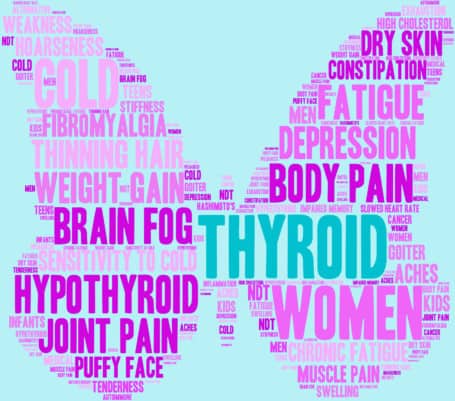Thyroid health is so important to our well being. The thyroid gland is a butterfly-shaped organ located in the base of your neck. The hormones it releases control metabolism (how your body uses energy). Thyroid hormones regulate many functions including these and more:
- Breathing
- Heart rate
- Central and peripheral nervous systems
- Body weight
- Muscle strength
- Menstrual cycles
- Body temperature
- Cholesterol levels
Keeping your thyroid healthy is important but it’s really up to you to make sure things are going smooth. Most thyroid conditions are diagnosed in late stages and only when they’ve progressed to a “disease.” Optimal thyroid health operates in a range far from a disease state so taking control and discovering your “optimal” is well worth it. Here are some tips:
Get the right tests
Did you know that approximately 60% of those with thyroid dysfunction don’t know they have it? That’s because most insurance companies don’t cover the proper testing for overall thyroid function so doctor’s are hesitant to order it. Typically only Thyroid Stimulating Hormone (TSH) and T4 (the storage form) are tested and the “normal” ranges are extremely wide. You can still have symptoms in the “normal” range and there is much more to the thyroid hormone story for understanding how it’s functioning. To get a complete picture you need the following:
- TSH
- Free T4
- Free T3
- Reverse T3
- Thyroid Peroxidase Antibodies
- Thyroglobulin Antibodies
Even if your doctor does order a complete thyroid panel, they’re usually relying on “normal” reference ranges that are too broad and often inaccurate. Contact me to help you assess if your levels are within “functional” ranges which are more indicative of optimal levels. If your physician can’t or won’t order the full panel, I can help guide you to appropriate testing resources. You do not need a physician to have these run.
Keep your gut healthy
Yes, all things begin in the gut! Research is coming out everyday about the role of the trillions of bacteria in your gut, known as your microbiome, which play a role in all aspects of your health.
Dr. Raphael Kellman, integrative and functional medicine doctor specializing in microbiome science explains that “about 20% of the conversion from T4 (the storage form of thyroid hormone) to T3 (the active form) happens in the gut. In an unhealthy microbiome, you could lose that 20%. Plus, your nutrient absorption will diminish and many of the nutrients that play a very pivotal role in thyroid function will be low.”
Fortunately, there are many steps you can take to rebuild a healthy microbiome, including healing a leaky gut, restoring healthy levels of beneficial bacteria, and eliminating the overgrowth of bad bacteria, yeasts, and parasites. This is a key part of my practice with clients.
Choose clean, healthy food
Ditch toxic and inflammatory foods and add in plenty of the nutrients needed for thyroid function. Gluten and dairy are the two foods that people with thyroid dysfunction should avoid. Gluten is hard on the gut, increases inflammation and can trick your immune system into attacking your thyroid. Dairy is biochemically similar to gluten so it works similarly. In addition, there are key nutrients the thyroid needs to be healthy like selenium, zinc, iron, copper, vitamins E, D, B12 and iodine – although iodine is tricky if you have or may have an autoimmune thyroid condition.
Watch your stress
There is a huge connection between thyroid and adrenal function. Stress can have a huge impact on the thyroid because it slows down thyroid hormone production. This reduces your ability to convert thyroid hormones to their active form, and increases thyroid hormone resistance.
Takeaway
Be your own best advocate! You know if you are feeling off, don’t let anyone tell you it’s not real or all in your head. You CAN get on top of your health and live vibrantly. With proper testing, diet and lifestyle adjustments your thyroid can be back in business. contact me to learn how I can help!


